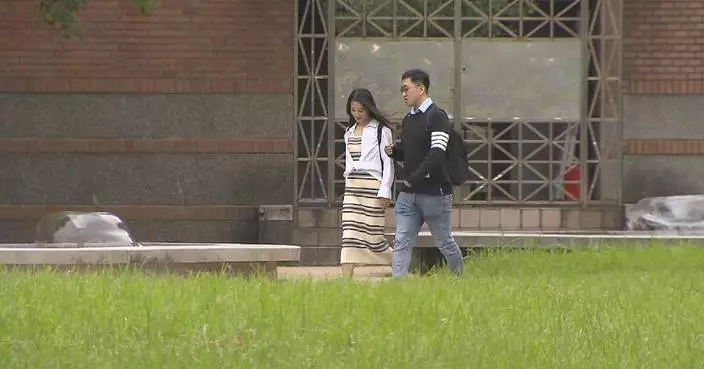China has been carrying out publicity and education campaigns to raise public awareness of the law and promote the building of a law-based government.
In this episode of a French-language documentary series titled "Classic Quotes by Xi Jinping", CGTN host Sui Xiang and French commentator Nicolas Irurzun visited the Dashilar sub-district judicial office in Beijing to witness what the government has been doing to promote legal literacy among the residents.
According to Chinese President Xi Jinping, a nation's strength or weakness depends on its adherence to the law.
The president has been known to quote a 2000-year-old Chinese proverb that says, "When those in power are resolute in upholding the rule of law, their state will be strong; when they are lax in doing so, their state will thus get weak. So no state can forever stay strong or weak."
According to the report to the 20th National Congress of the Communist Party of China, a comprehensive framework for law-based governance has taken shape in China, and its system of socialist rule of law with Chinese characteristics is the subject of persistent improvement.
Among its recent revisions is the introduction of the Civil Code that went into effect in 2021. Like a social encyclopedia, the code covers all aspects of Chinese people's life.
Residents in Dashilar, which is known in the Chinese capital for its sprawling traditional alleyways, have been becoming intimately familiar with the Civil Code thanks to the community's creative efforts in basic legal education.
"The Civil Code is about laws," a young boy in Dashilar explained.
"It is about fraud prevention and marriage issues," a woman said.
"The section on safeguarding legal rights can provide people with more help," a man adds.
The local judicial office has been popularizing legal knowledge at a grassroots level, adopting the unique method of Peking Opera, as the community is the birthplace of the traditional Chinese art.
"Our office is the lowest rung of the judicial administrative ladder. We are a primary unit, which closely relates to people's everyday life. One of our daily tasks is to popularize laws and relevant knowledge. As Dashilar is the birthplace of Peking Opera, we wondered whether we could combine this with popularizing basic legal knowledge," said Li Jingming, head of the Dashilar Sub-district Judicial Office.
Li exemplified his point with the play "Chisang Town", one of the shows performed in the community. The play tells the story of Bao Zheng, an orphan who was raised by his sister-in-law and became a magistrate in central China's Henan Province.
As a man known to always uphold justice, Bao did not spare his sister-in-law's son when the latter became involved in corruption. After he sentenced the criminal to death, Bao cared for his sister-in-law until the last moment of her life.
After the performance, a lawyer elaborates on the legal knowledge related to the plot of the play.
"According to Article 1075 of the Civil Code, younger brothers or sisters who have been brought up by their elder siblings and who are financially capable have the duty to support such elder siblings who lack both the capacity to work and the means to support themselves," Zhan Wenjun, a lawyer, explained to the audience after the play.
According to Li Xiaohui, Party secretary of Dashilar, the idea of promoting residents' awareness of the law through Peking Opera blossomed from the fact that concerns among the community's elderly people -- who are often loyal Peking Opera enthusiasts -- population regarding the legal provisions in the Civil Code.
"Many residents living here are elderly people, making up 28 percent of the total number. They are concerned most about legal provisions related to pensions and elderly support. Informing them about the relevant laws by just reading out the provisions is rather boring. The audience often struggle to understand. Given the unique characteristics of our area, we combined Peking Opera with the popularization of laws, making education about the laws more vivid. So the elderly can enjoy the operas and learn about some laws and regulations related to themselves," said Li.
Residents have hailed the ingenious way of popularizing legal knowledge.
"Now, laws are popularized through Peking Opera. After every opera segment, lawyers explain the laws relating to it," said a resident.
"When I watched operas before, I never knew there was so much information in them. We need to protect ourselves with laws," said another resident.
"I think the Civil Code issued this time is close to people and excellent," said a third resident.
The Civil Code, compiled and enacted in the course of 66 years, comprises 1,260 provisions and regulations focusing on hotspot issues in society and involves all aspects of people's livelihood.
The Civil Code aims to develop whole-process people's democracy while taking into full consideration the opinions of the general public, and actively responds to their concerns. The Civil Code is a milestone in China's comprehensive advancement towards the rule of law in national governance.
By the end of June 2022, more than 730 laws and sets of administrative regulations had been enacted and revised.
Since 2012, the socialist legal system with Chinese characteristics has kept becoming more scientific and complete. As of March 13, 2023, there were 294 valid laws and 598 sets of administrative regulations in force in China. China has accelerated legislation in key areas such as national security, cyber security and foreign investment to ensure China's vigorous economic development, prosperity and stability of the national economy and people's livelihood.
Irurzun also noted the importance of incorporating the spirit of law-based governance into daily life and promoting law abidance, which he considers to be the key to China's stability and prosperity.
"Only law-based governance can ensure a country's security and prosperity. China is a good example of this. The progress China has made in various fields comes from the proper usage of laws as well as confidence in the legal system. Of course, the authority of law-based governance needs to be maintained by the people. Incorporating the spirit of law-based governance into daily life and promoting law abidance by all the people create the inherent momentum to realize China's lasting stability. This is also the key to keeping China prosperous," said Irurzun.
"When those in power are resolute in upholding the rule of law, their state will be strong; when they are lax in doing so, their state will thus get weak. So no state can forever stay strong or weak. Through long-time efforts, a socialist legal system with Chinese characteristics has been formed. We now have laws to go by in almost all aspects of our national and social affairs. This is a major achievement we have made and a new starting point from which we can continue to move forward," Xi said at a conference on celebrating the 60th founding anniversary of the National People's Congress (NPC) on Sept 5, 2014.

China's relentless, creative efforts in improving legal awareness gain public recognition

China's relentless, creative efforts in improving legal awareness gains public recognition









